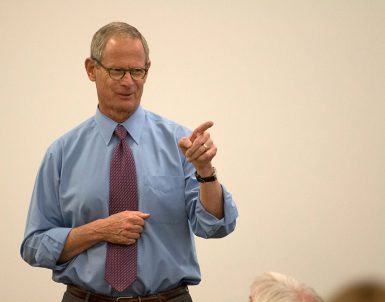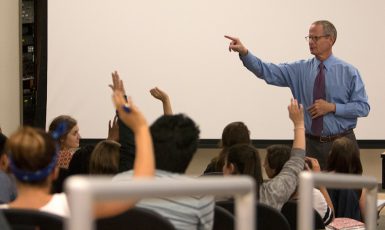Tash leads students through mock Pulitzer vote

For the second year in a row, Tom French’s Behind the Prize class chose different winners compared those of the Pulitzer Prize board.
Paul Tash, former chair of the board and current chairman of Times Publishing and the Poynter Institute for Media Studies, compared notes with students Wednesday. He coached the class by describing the process, then moderating debate about the three finalists for the 2014 Pulitzer Prize for Investigative Reporting.
All Pulitzer submissions go through a two-tier process, Tash explained. Every entry is judged first by juries, who choose three articles for each separate prize from more than 100 submissions. The juries then send their selections to the board, who discuss the finalists around the fabled old copy desk of Joseph Pulitzer’s The World at Columbia University.
Winners are chosen by majority vote. The debates surrounding the pieces are always “exquisite,” said Tash, as the discussion alone can move minds and votes. Unanimous votes are rare, but it has happened, he added.
Finally, it was time for the student discussion to begin.
“Now we convene as the Board of the Pulitzer Prize,” Tash announced, arms wide. He took off his jacket, placed it on a chair, and stood at the front, ready for the raised hands that followed.
Three articles were up for discussion. The first was a piece from the Sacramento Bee, a regional metro newspaper, that probed a Las Vegas mental hospital that used commercial buses to “dump” more than 1,500 psychiatric patients in 48 states over five years, including some who were dangers to those around them.

It was followed by a piece from Reuters that exposed an underground Internet marketplace for parents who wanted to give up their unwanted, internationally adopted children. The third was a piece from the Center for Public Integrity that exposed lawyers and doctors who rigged the system so that coal miners suffering from black lung disease would be denied their benefits.
All the pieces triggered change in their respective communities.
Over the course of class, the students and Tash discussed exactly what to consider when evaluating finalists — and, in the process, established tips for students when writing their own work.
Good writing and a strong narrative is, naturally, considered for most of the Pulitzer categories, Tash said. Many students cited emotional engagement as important in their decision-making process.
But perhaps more important to the students was a desire to read something they never thought they’d read before. Tash agreed.
“’Tell me something I don’t know’ is a great motto for our business,” he said.
He told the story of an editor for The Washington Post who was in charge of the prestigious A1 news feature space. Journalists would pitch their ideas. But the editor always said, “If I think I might have heard something about this sometime, no.”
Tash proposed another important question: Would I read this if I didn’t have to?
Some of the stories, particularly the features, could get a little long, he said.
“Think about the most memorable piece of classical music you know—Beethoven’s 5th,” he said. “It doesn’t meander around. It starts out powerfully. It doesn’t wait to announce itself.” Pulitzer winners, he said, get to the point.
Presentation of the pieces is also important, he said. But the students and the board both occasionally take into consideration other outside details, particularly for investigative reporting, an expensive venture difficult for smaller papers to undertake.
When the time for the vote came, it took three motions to finally land on the winner: the report from Reuters about the adoption scandal. Many students felt a strong emotional reaction to the piece, and said it was the most original of the three pieces. The actual 2014 Pulitzer Prize for Investigative Journalism was awarded to the Center of Public Integrity for the black lung story.
Tash’s time on the board taught him two things.

One: It’s really, really hard to win a Prize, he said. His own paper, the Tampa Bay Times, has won several awards, but he noted that there was “a lot of good work that doesn’t win anything.”
Second: That that are some things the public knows about in this world only because of journalists. That journalism, he said, is a righteous cause worth pursuing, even today in a world of uncertainty. The Sacramento Bee piece, for example, had been discovered only because a journalist took the time to listen to a homeless man at a bus station.
“The last 10 years has been punishing economically on papers,” Tash said. “But the work submitted was as good at the end of my term as it was at the beginning.”
Tash, BA’76, is a frequent visitor to the school, and this was the second year in a row he visited to discuss Pulitzers. French said this exercise last year was many students’ favorite session.
The class features guest speakers nearly each week who have won or been finalists for prestigious prizes, including the Pulitzer.
Read the 2014 Pulitzer Prize winners on the Pulitzer website and make your own decision about who should have won.

